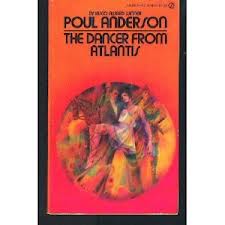A good writer controls point of view (pov) throughout a novel. I have commented that, in Poul Anderson's The Dancer From Atlantis (London, 1977), Duncan Reid is the main view point character although, of his time traveling companions, Erissa has the point of view twice and Oleg and Ulwin once each.
However, there is one single anomalous paragraph. In a passage narrated from Reid's pov, Reid and Erissa, at Ulwin's bidding, leave Ulwin alone to fight Athenians. We are told what happens after their departure.
"That departure shocked the Athenians into motion." (p. 161)
- and Ulwin lets them get near. So far, this could be as described by a third party observer. When Ulwin is pierced by a spear, we are told that:
"He didn't seem to notice." (p. 161)
- so this sentence at least is not his pov. When they have finally finished him, we are told that:
"...no survivor among them was ever quite hale again." (p. 161)
Either the point of view has become collective, covering the entire group of Athenians, or the omniscient third person narrator here directly informs the reader without channeling the narration through the viewpoint of any of the characters.

No comments:
Post a Comment